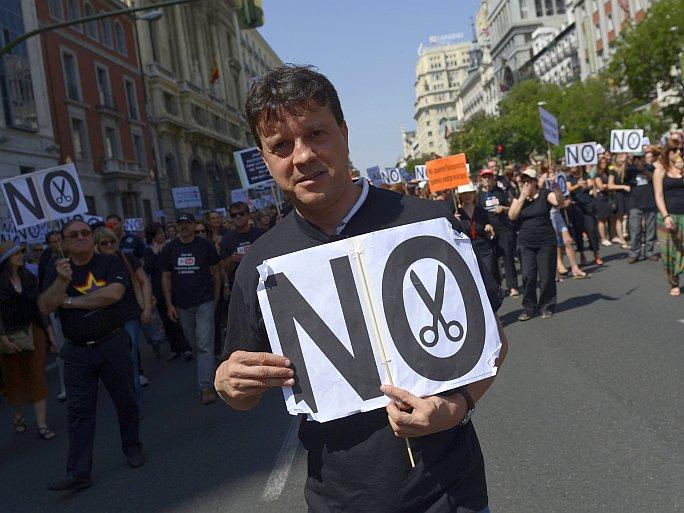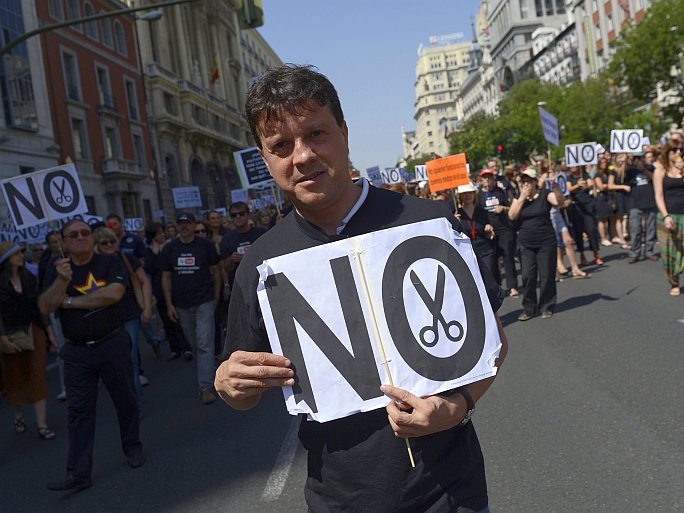The European Central Bank decided to leave rates unchanged, economic data continues to signal a deepening recession, and political as well as social unrest in Spain and Greece keeps European Union leaders busy.
In what was essentially a nonevent, the European Central Bank (ECB) decided to keep rates on hold and left them at 0.75 percent. The rate mechanism—much like in the United States—is turning more and more obsolete, as most banks in the core of Europe do not use the facility any longer and instead finance through deposits from the periphery and longer term ECB refinancing (LTRO).
Banks in the eurozone periphery still depend on ECB funding, and lower rates would mean a reduction in funding costs for them, but at the same time, could hurt their net-interest margin, if they were to lend out the money. This is unlikely, however, as they are so undercapitalized that they will use any savings to shore up capital, as opposed to putting the funds at risk again.
More importantly, the ECB said that its Outright Monetary Transaction (OMT) vehicle to buy up short-term bonds stands at the ready, but needs to be activated first. Spain is rumored to be ready to ask for a formal bailout, with the activation of the program to occur some time within the next six weeks, as its cash reserves deteriorate and bond yields rise.
Geopolitical factors, such as the upcoming regional elections in Galicia, the Basque country, and Catalonia—the latter having openly debated secession—as well as the recapitalization of the Spanish banking system, precludes Spain from making a quick decision. The Spanish populace was also far from happy welcoming EU “overlords” and has staged mass protests throughout the country, which ended in violent clashes with the police.
Economic Data Still Deteriorating
Meanwhile, the eurozone economy is turning further south, with European automobile sales disappointing and unemployment at a record high of 11.4 percent. Spain and Greece have unemployment rates north of 25 percent and Greece is again running out of cash.
Officials from creditor nations visited Greece last week to assess the progress the country is making after having been bailed out twice. They were greeted by angry citizens who threw different sorts of trash at them, which resulted in the inspectors having to take flight.
On the economic front, Greece might run out of cash as early as November. The inspectors are supposed to submit their report during the course of October and chances are it will not be pretty, with Greece missing most of its budget savings targets, much like how it missed all of its previous targets.
This will stretch the patience of German Chancellor Angela Merkel, who is going to visit Greece Oct. 9 under heavy police protection. German taxpayers are unlikely to approve supporting a third bailout.
On the other hand, the EU is hell-bent on keeping Greece in the euro, so alternative solutions, including more backdoor ECB financing, must be found in order to buy more time. This will most likely happen at the meeting of European finance ministers Oct. 8–9.
Despite all of this, markets were broadly in the black for the week. The euro was up 1.3 percent against the dollar to close at $1.30, the EURO STOXX index rallied 3.1 percent with the Greek stock market going up 12.3 percent, and the banking sector rallying 5.7 percent.
The Week Ahead
Ratings agency Moody’s Investors Service was supposed to come out with a review of its rating on Spain, but has delayed the publication. If the agency decides to downgrade Spain from investment grade to junk, it could speed up the process of Spain asking for an outright bailout.
On a positive note, at least for the short-term, the European Stability Mechanism (ESM) will become operational in mid-October after the first meeting of its board of governors to place on Oct. 8. The board will likely issue some further guidelines on its modus operandi and also release more details on when it will be fully operational.
In terms of economic data, German and euro-area industrial production as well as Italy’s budget deficit will be of interest this week.
The Epoch Times publishes in 35 countries and in 19 languages. Subscribe to our e-newsletter.







